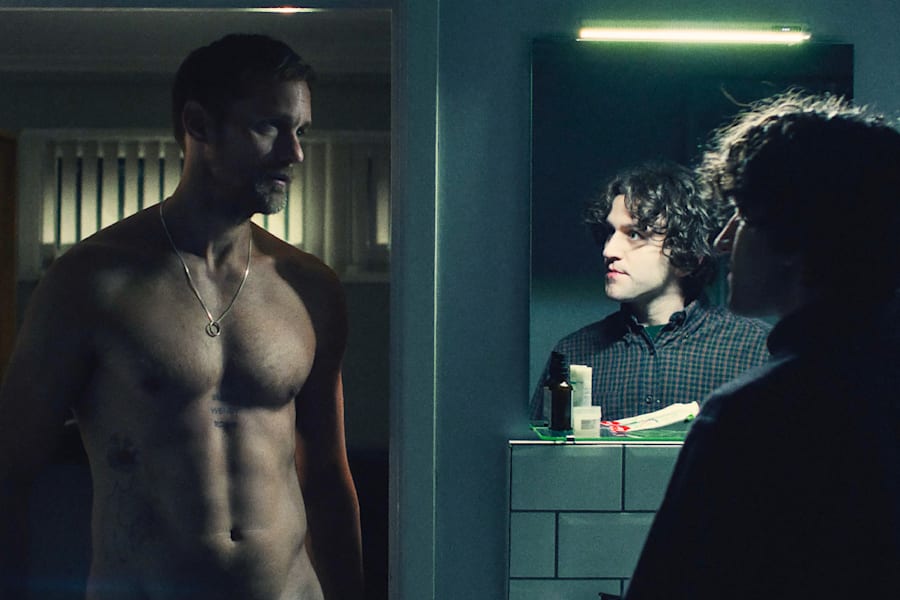How to cum through your thumb: What the able-bodied can learn from disabled sex

Within my lifetime, disability’s gone from something I felt I needed to hide for fear of stigma, to an aspect of my identity I see reflected and respected within elements of mainstream culture—thanks to decades of advocacy work.
A growing roster of celebrities and influencers are opening up about the nitty-gritty of their experiences with physical and mental differences. Disabled writers, researchers, and activists increasingly shape discourse around their own conditions. And, as a result, popular depictions of disability are far more diverse, nuanced, and widespread than they were even at the turn of the millennium.
Yet, for all these advances, it’s still pretty damn hard to find depictions of people with disabilities as sexually desirable beings, much less steamy scenes of disabled sex, across any band of media. “People continue to feel uncomfortable about that,” explains Fran Odette, a longtime disability justice advocate and educator who co-authored The Ultimate Guide to Sex and Disability.
Of course, there are exceptions. TV shows like Love on the Spectrum, the 2022 Queer As Folk reboot, The L Word: Generation Q, and just about anything writer-actor Ryan O’Connell touches are examples of representation done right.
But the discomfort Odette refers to remains widespread and deeply entrenched, in large part because it’s embedded in a longstanding historic tendency to desexualize people with disabilities. Today, much of that impulse is rooted in infantilizing paternalism—a desire to “protect” the disabled from rejection, predatory fetishization, or other potential harms. All too often, able-bodied folks are too careful, uncomfortable, or uncertain and cautious around people with disabilities, which basically precludes thinking of them as sexual beings.
“It’s a really devastating manifestation of ableism, this idea that because you’re disabled you’re not sexually valuable,” says disability justice scholar Anna Mollow. It just really sucks.”
In reality, people with every sort of disability—who together account for up to 25% of the US population, according to the CDC—are just as sexual as any other group. In fact, despite a glaring lack of disability-focused sex ed or supportive resources, many disabled folk have particularly active and inventive sex lives. Some who acquired their disabilities later in life even say they find sex more fulfilling than they did when they were able-bodied. “Disabled sex is the best sex,” argues Andrew Gurza, a disability awareness consultant whose work covers sexual visibility and accessibility. So, if you’re ignoring disabled sexual experiences, “you’re missing the fuck out.”
In light of this gap—and my own frustrations with it as a sex writer and a person with disabilities—I’d like to make the case this Disability Pride Month that, rather than desexualize the disabled community, the wider world could and should take a few tips on sex from folks who live with differences. Because, as sex educator and coach Dr. Mitchell Tepper likes to say, “you don’t have to break your neck to be a great lover, but you could certainly learn a lot from someone who has.”
Going off script
Whether through porn, pop culture, or our peers, most of us internalize sexual scripts, explains intimacy coach Amber DiPietra, deep-seated ideas about what good sex looks like and how an ideal encounter ought to flow. The culturally dominant vanilla-hetero script usually involves moving in sequence through the four metaphoric bases, Dr. Tepper explains, and ends with an orgasm—ideally for both partners. Queer and kink folk might put some spin on that script. But, even when we mix it up, most of us accept elements of the norm, or fall into our own patterns. So, when two able-bodied people hook up, DiPietra adds, “maybe not much discussion has to happen.”
Many disabilities interfere with the ability to follow those scripts. To get turned on or physically aroused. To get into specific positions or enjoy certain sensations. To go at it for long periods of time or even reach a conventional climax. I for one have notable tremors in my hands, issues with balance and coordination, and no feeling in half of my mouth and tongue, so my ability to do anything acrobatic, dexterous, or oral—I’ll let your mind fill in the blanks here—is pretty limited.
When you can’t live up to a sexual script, it’s easy to feel like a failure, Odette explains. Some people with disabilities—especially those who develop severe physical limitations later in life—accept that feeling, and give up on sex. “But we can look at disability as disruptive,” Dr. Tepper argues, “and that’s a good thing. It’s disruptive of performance-based, goal-oriented sex.”
Disability forces people to get creative. Often, folks find clever workarounds to make “standard” sex acts work for them—anything from using pillows to hold a position their body alone can’t support, to 3D-printing a handle which helps them use a sex toy with limited grip strength or dexterity, to embracing forms of kink to channel or distract from chronic pain. Or they “maybe get away from the idea that sex has to be acrobatic,” explains Mollow, and come up with “ways of being intensely erotic while moving less.” Or they reconsider “what constitutes a sex act entirely,” adds DiPietra, perhaps abandoning the pursuit of an orgasm if that’s stressful or painful for them, and instead focusing on any act or sensation that brings them pleasure.
“Your whole approach has to be different,” DiPietra argues, “more expansive, more attentive, slower, more mindful. You have to speak about what your body needs, because it’s not immediately apparent to people. That is more vulnerable and empowering at the same time.”
Everyone stands to benefit from questioning their internalized sexual norms and finding what actually brings their—and their partners’—bodies pleasure. Everyone deserves to adapt sex such that it works for their personal abilities and needs. And everyone can, if you do what disability requires many of us to do. As DiPietra puts it, “Slow down. Pay attention. Drop your expectations. Look at what’s really happening in your body and encounters. Speak about it.”
“With every partner, before you have any kind of sexual experience,” Gurza adds, “You should ask, ‘Hey, for this experience… What can we do so that you’re super comfortable?’” From there, you can co-author a new, bespoke script for that encounter in the moment.
This sort of introspection and candid, vulnerable conversation is not easy. But as Cassandra J. Perry, a self-described “recovering” sex educator, points out, people with disabilities are not inherently, uniquely skilled at having these conversations. Sexually active disabled folk often just have more practice. “For disabled and non-disabled people,” they note, “communication is key, and we all need to work on it. Informed consent is mandatory, and with practice it’s downright sexy.”

Discovering erogenous zones
Some disabilities affect not only if and how a person can match a sexual script, but also whether they’re able to experience the sensations most folks associate with sex. I’m not just talking about conditions that impact genital function—although Odette points out that far too many people do make the genitals the be-all and end-all of sex—or the ability to orgasm. A burn injury might, for example, limit a person’s ability to feel a once-exciting caress, or even turn that sensual touch into a source of pain. Surgeries like a proctectomy can take anal play off the menu. Even smell loss, which I also suffer from, seems to dampen the subtle sensory feedback we get from a partner’s scent during sex.
Through trial, error, and close attention to what does and doesn’t feel good within their own bodies, people with disabilities who can’t access traditional erogenous zones or sensations simply find new ones. I’ve spoken to several people with spinal cord injuries, for example, who claim they become incredibly attuned to sensation above the line of paralysis in their bodies—and I’ve heard of at least one man who can cum just through stimulation of his right thumb. It is certainly possible to orgasm without genital stimulation. Many people are familiar with nipple orgasms, so-called coregasms, and sleep orgasms, and there are plenty of reports of folks orgasming using only their mind.
Some people pursue what Dr. Tepper calls “energetic orgasms,” an ecstatic release you can build to through fantasy, motion, breath work, or other seemingly non-sexual activities. Others find a sense of release and satisfaction by getting a partner off. And others focus on cuddling, rolling around together, or doing whatever else makes them feel closer to their partner and fulfilled.
“The whole breadth of what’s possible around sexual pleasure is often not even talked about, or fully explored, until a person experiences some kind of bodily change,” explains Odette.
But you don’t need to wait for that sort of change to access these diverse erogenous zones and experiences and infinitely varied realms of pleasure. Just cultivate the same sense of awareness that disabled folk often have to. “As someone with a chronic illness, I have to constantly monitor how I am feeling and adjust my activities to make sure that I don’t… send myself into a flare-up,” explains Katie Tatstrom, an activist who’s written about the unique upsides of disabled sex. “This same understanding of my body helps me to find ways to not just decrease pain, but also increase pleasure.”
Who can learn from disabled sex?
“You should care about disability, whether or not it’s happening to you,” argues Gurza.
Disability is simply part of the diverse human experience. So learning about how people with disabilities navigate all aspects of the world not only acknowledges our shared humanity and shows basic respect, it gives us a more complete sense of human reality and possibility.
“Disabled people are doing lots of interesting writing about sexuality, making films about sexuality,” Mollow adds. Gurza himself notably appeared in an educational porn film in 2019, and worked on the 2022 reboot of Queer as Folk, both as a consultant and in a sex scene.
But you should also care about how people with disabilities navigate sex because, as Odette points out, everyone is likely to lose some degree of ability at least temporarily, especially as we get older. Really, she says, we could think of able-bodied people—the social norm—as the temporarily non-disabled. “These able-bodied people who think sex is tied to ability are going to have a really rude awakening when one day they can’t do those things anymore,” Gurza agrees.
“We have to talk about adapting our sex lives now, so that when that happens to you, or when you have a partner who has a disability, you already have a playbook ready to go,” he adds.
To learn more, Gurza recommends speaking to disabled folk about their experiences. “Be willing to talk about it,” and you’ll find people who want to share their insights.
The Feeld community is filled with people who get it, including those with lived experience of disability, and those who understand that sex isn’t a one-size-fits-all phenomenon. If you want to start exploring, we’re waiting for you.


